There’s a Book for That: Native American Heritage Month
 November is Native American Heritage Month and current events are shining a light on this nation’s sad history of Native-American relations. Many, including famous actors and activists, have taken up the cause of the Native people in protests over the North Dakota pipeline. Disparaging stereotypes have plagued tribal members for decades. In contrast, Native cultures in the Americas were far from uncivilized or savage. Societies were often egalitarian; Tribal civilizations could be massive and urban and their governments were quite well-developed.
November is Native American Heritage Month and current events are shining a light on this nation’s sad history of Native-American relations. Many, including famous actors and activists, have taken up the cause of the Native people in protests over the North Dakota pipeline. Disparaging stereotypes have plagued tribal members for decades. In contrast, Native cultures in the Americas were far from uncivilized or savage. Societies were often egalitarian; Tribal civilizations could be massive and urban and their governments were quite well-developed.
In commemoration of the culture and people that were the original settlers of this land, we present the following books that celebrate and offer insight into Native life.
FEATURED TITLES
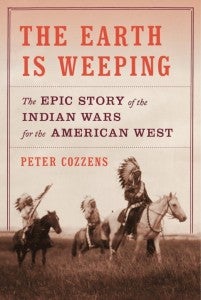 THE EARTH IS WEEPING: THE EPIC STORY OF THE INDIAN WARS FOR THE AMERICAN WEST by Peter Cozzens
THE EARTH IS WEEPING: THE EPIC STORY OF THE INDIAN WARS FOR THE AMERICAN WEST by Peter Cozzens
Bringing together a pageant of fascinating characters including Custer, Sherman, Grant, and a host of other military and political figures, as well as great native leaders such as Crazy Horse, Sitting Bull, Geronimo, and Red Cloud, The Earth is Weeping—lauded by Booklist as “a beautifully written work of understanding and compassion”—is the fullest account to date of how the West was won…and lost.
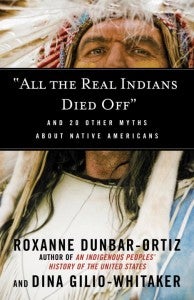 “ALL THE REAL INDIANS DIED OFF”: AND 20 OTHER MYTHS ABOUT NATIVE AMERICANS by Roxanne Dunbar-Ortiz, Dina Gilio-Whitaker
“ALL THE REAL INDIANS DIED OFF”: AND 20 OTHER MYTHS ABOUT NATIVE AMERICANS by Roxanne Dunbar-Ortiz, Dina Gilio-Whitaker
In this enlightening book, scholars and activists Roxanne Dunbar-Ortiz and Dina Gilio-Whitaker unpack the twenty-one most common myths and misconceptions about Native Americans that have misinformed generations.
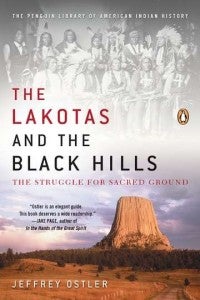 THE LAKOTAS AND THE BLACK HILLS: THE STRUGGLE FOR SACRED GROUND by Jeffrey Ostler
THE LAKOTAS AND THE BLACK HILLS: THE STRUGGLE FOR SACRED GROUND by Jeffrey Ostler
The Lakota Indians made their home in the majestic Black Hills mountain range during the last millennium, drawing on the hills’ endless bounty for physical and spiritual sustenance. Yet the arrival of white settlers brought the Lakotas into inexorable conflict with the changing world, at a time when their tribe would produce some of the most famous Native Americans in history, including Red Cloud, Sitting Bull, and Crazy Horse.
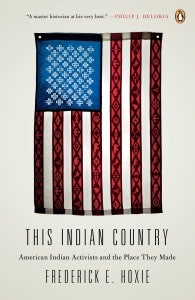 THIS INDIAN COUNTRY: AMERICAN INDIAN ACTIVISTS AND THE PLACE THEY MADE by Frederick Hoxie
THIS INDIAN COUNTRY: AMERICAN INDIAN ACTIVISTS AND THE PLACE THEY MADE by Frederick Hoxie
In this bold and sweeping counter narrative to our conventional understanding of Native American history, celebrated academic historian Frederick E. Hoxie presents the story of Native American political activism—a chronicle that spans more than two hundred years. Highlighting the activists—some famous and some unknown beyond their own communities—who have sought to bridge the distance between indigenous cultures and the U.S. republic.
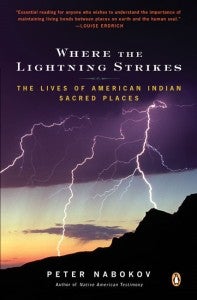 WHERE THE LIGHTNING STRIKES: THE LIVES OF AMERICAN INDIAN SACRED PLACES by Peter Nabokov
WHERE THE LIGHTNING STRIKES: THE LIVES OF AMERICAN INDIAN SACRED PLACES by Peter Nabokov
For thousands of years, Native Americans have told stories about the powers of revered landscapes and sought spiritual direction at mysterious places in their homelands. In this important book, respected scholar and anthropologist Peter Nabokov writes of a wide range of sacred places in Native America.
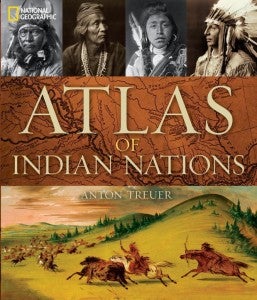 ATLAS OF INDIAN NATIONS by Anton Treuer
ATLAS OF INDIAN NATIONS by Anton Treuer
In the most comprehensive atlas of Native American history and culture available, the story of the North American Indian is told through maps, photos, art, and archival cartography.
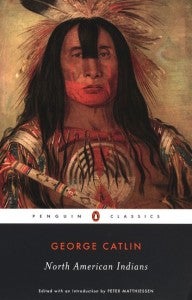 NORTH AMERICAN INDIANS by George Catlin
NORTH AMERICAN INDIANS by George Catlin
Catlin’s unprecedented fieldwork culminated in more than five hundred oil paintings and his now-legendary journals, which, as Peter Matthiessen writes in his introduction, “taken together… constitute the first, last, and only ‘complete’ record of the Plains Indians ever made at the height of their splendid culture.”
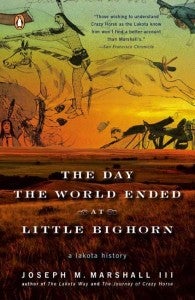 THE DAY THE WORLD ENDED AT LITTLE BIGHORN: A LAKOTA HISTORY by Joseph M. Marshall III
THE DAY THE WORLD ENDED AT LITTLE BIGHORN: A LAKOTA HISTORY by Joseph M. Marshall III
The saga of Custer’s Last Stand has become ingrained in the lore of the American West, and the key players – Crazy Horse, Sitting Bull, and George Armstrong Custer – have grown to larger-than-life proportions. Now, award-winning historian Joseph M. Marshall presents the revisionist view of the Battle of the Little Bighorn that has been available only in the Lakota oral tradition.
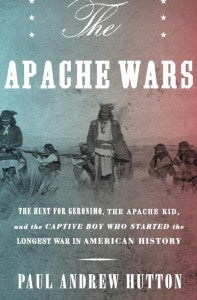 THE APACHE WARS: THE HUNT FOR GERONIMO, THE APACHE KID, AND THE CAPTIVE BOY WHO STARTED THE LONGEST WAR IN AMERICAN HISTORY by Paul Andrew Hutton
THE APACHE WARS: THE HUNT FOR GERONIMO, THE APACHE KID, AND THE CAPTIVE BOY WHO STARTED THE LONGEST WAR IN AMERICAN HISTORY by Paul Andrew Hutton
A stunningly vivid historical account of the manhunt for Geronimo and the 25-year Apache struggle for their homeland. They called him Mickey Free. His kidnapping started the longest war in American history, and both sides—the Apaches and the white invaders—blamed him for it. A mixed-blood warrior who moved uneasily between the worlds of the Apaches and the American soldiers, he was never trusted by either but desperately needed by both.
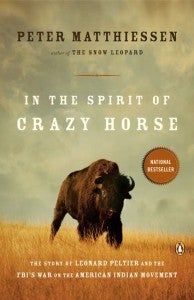 IN THE SPIRIT OF CRAZY HORSE: THE STORY OF LEONARD PELTIER AND THE FBI’S WAR ON THE AMERICAN INDIAN MOVEMENT by Peter Matthiessen, Martin Garbus
IN THE SPIRIT OF CRAZY HORSE: THE STORY OF LEONARD PELTIER AND THE FBI’S WAR ON THE AMERICAN INDIAN MOVEMENT by Peter Matthiessen, Martin Garbus
On a hot June morning in 1975, a desperate shoot-out between FBI agents and Native Americans near Wounded Knee, South Dakota, left an Indian and two federal agents dead. Peter Matthiessen (1927-2014) has written an “indescribably touching, extraordinarily intelligent” (Los Angeles Times Book Review) chronicle of the tragedy.
FOR YOUNGER READERS
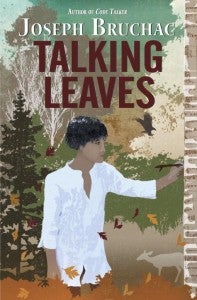 TALKING LEAVES by Joseph Bruchac; Ages 10 And Up
TALKING LEAVES by Joseph Bruchac; Ages 10 And Up
From the acclaimed author of Code Talker, a compelling new work of historical fiction about Sequoyah and the creation of the Cherokee alphabet. Thirteen-year-old Uwohali has not seen his father, Sequoyah, for many years. So when Sequoyah returns to the village, Uwohali is eager to reconnect and learn from one of his people’s greatest craftsman. But Sequoyah’s new obsession with making strange markings causes friends and neighbors in their tribe to wonder whether he is crazy or worse-
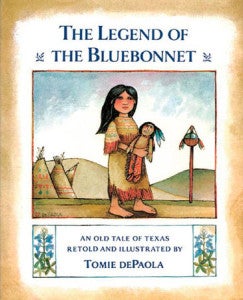 THE LEGEND OF THE BLUEBONNET by Tomie dePaola; Ages 4 to 8
THE LEGEND OF THE BLUEBONNET by Tomie dePaola; Ages 4 to 8
When a killing drought threatens the existence of the tribe, a courageous little Comanche girl sacrifices her most beloved possession–and the Great Spirit’s answer results not only in much needed rain but a very special gift in return. “An ideal complement to Native American and Texas studies…” – Booklist
For more information about these and related titles visit Native American Heritage Month.
